MRSA, or Methicillin-resistant Staphylococcus aureus, can be defined as the variety of staph bacteria that is resistant to common antibiotics used to treat staph infections. Over the years certain strains of bacteria have become antibiotic resistant, due in part to the overuse of antibiotics and the genetic mutations within the bacteria. Generally speaking, only a very small percentage (1%) of the population carry the MRSA strain, and they may not even know it because they don’t get sick.
Healthy people (30%) carry Staphylococcus aureus in their nasal passages, or on the skin, but it typically doesn’t cause an infection. However, the infection occurs when the bacteria enters the body through a break or cut on the skin. Treatments for MRSA is more difficult than most strains of staphylococcus aureus, but can MRSA be cured completely? The bottom line is if MRSA is not treated quickly, the condition could lead to sepsis and/or death.


.jpg)
Types of MRSA
There are two classifications of MRSA community-acquired (CA-MRSA), and hospital-acquired (HA-MRSA).
CA-MRSA
Community-associated MRSA infections occur in healthy people who have not had a medical procedure or been hospitalized within the past year. Anybody can get CA-MRSA through direct contact with an infected wound, or close personal contact with an infected person. Poor hygiene, such as the lack of or improper hand washing, may spread the bacteria easily, and outbreaks are common among injection drug users, athletes, prisoners, daycare attendees, and other groups of people who live in crowded settings and routinely share contaminated items.
HA-MRSA
Hospital-acquired (HA-MRSA) infection occur in people who’ve had a recent history of hospitalization, surgery, dialysis, or resided in a long-term healthcare facility within the last 6
months. This includes people who’ve recently had an indwelling catheter, intravenous line, or
any other medical device present at the time the culture is taken. You can get an HA-MRSA infection through direct contact with poorly sanitized surgical instruments, contaminated hands, or contaminated linens. It can lead to severe health issues, such as blood infections and pneumonia.
Can MRSA Be Cured Completely?
The good news is yes, and although MRSA is difficult to treat, and is resistant to many antibiotics, decolonisation and a few antibiotics can cure MRSA infections. A standard treatment can include the use of a chlorhexidine oral rinse, mupirocin nasal ointment, and a full-body wash using chlorhexidine soap for a period of 5 days. Urinary-tract and intestinal colonies are treated with vancomycin (oral) and sulfonamides, such as cotrimoxazole. Vaginal colonies are treated with an octenidine solution. Other antibiotics can be added to the regimen if the treatment fails. Successful decolonization is determined to be achieved if the results are negative for 3 consecutive sets of cultures, and a standardized regimen for MRSA decolonization is very effective in people who fully complete the treatment.
How Else Is MRSA Treated?
People who have a skin infection can be tested for MRSA using a culture, and the results are usually available within 2 to 3 days. However, for those who have infections in internal organs, such as the bone, joints, or lung, a blood test is typically required in conjunction with imaging, such as a computed tomography scan (CT), x-ray, or echocardiogram. If the diagnosis is confirmed, you will usually be prescribed an antibiotic, and when the results of the culture are available, the dose, or type may be changed.
Can MRSA Be Prevented?
Again, not only can MRSA be cured completely, it can also be prevented. The following measures can help reduce the risk of catching or spreading the CA-MRSA infection:

- Hand washing: The most important thing you can do is to practice proper hygiene by washing your hands on a regular basis. This is the most effective way to prevent spreading MRSA. Begin by scrubbing your hands thoroughly for at least 20 seconds before drying them with a clean unused towel. Use different towel to turn off the faucet. Medical experts strongly suggest carrying a hand sanitizer that contains 60% alcohol to ensure your hands can be kept clean when there is no access to soap and water.
- Use bandages: You’ll want to keep any skin lesions covered all the time. Using bandages also guards against the possibility of any infection or other fluids containing the Staphylococcus aureus from contaminating surfaces that you or any other people may touch.
- Don't share items. This includes but is not limited to personal items, such as linens, towels, razors, and athletic equipment.
- Sanitize all linens. When you have skin lesions or cuts, you’ll need to wash all your linens regularly, including any athletic or gym clothing in hot water using bleach as a sanitizer. When drying, set the dryer to its highest setting as an extra precaution.
For those that have been diagnosed with HA-MRSA, they are usually temporarily isolated as a precaution until their condition improves. The isolation helps prevent the HA-MRSA infection from spreading. Hospital employees caring for HA-MRSA patients follow very strict guidelines and hand washing procedures. Any visitors, along with the hospital personnel, have to wear protective gowns and gloves to prevent them from any contact with contaminated surfaces, and any contaminated surfaces and linens are thoroughly sanitized on a regular basis.
